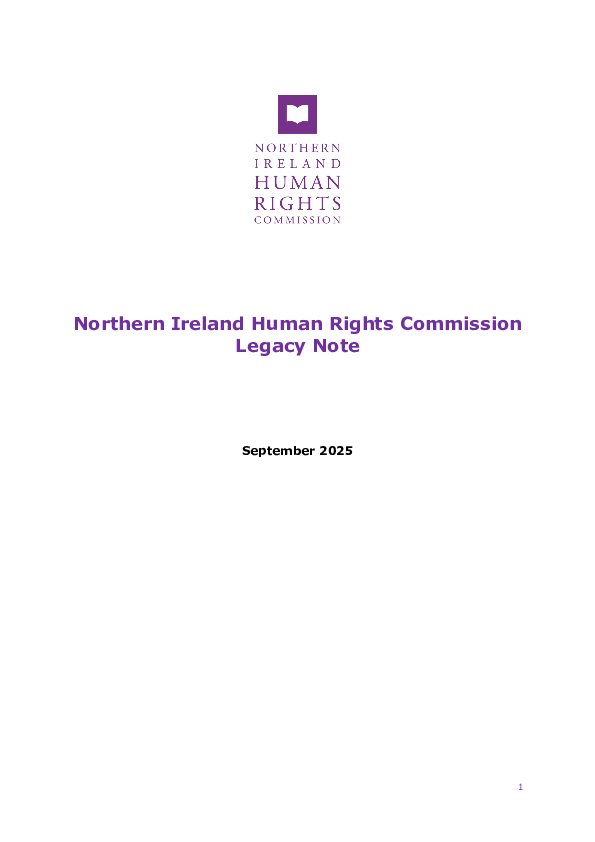Northern Ireland Human Rights Commission Legacy Note
Date produced: September 2025
The Northern Ireland Human Rights Commission (NIHRC) has published a report setting out its rationale for advice regarding the Independent Commission for Reconciliation & Information Recovery (ICRIR) and Northern Ireland Troubles (Legacy and Reconciliation) Act 2023 (Legacy Act). This restates a long-standing position.
To be independent, human rights law requires that investigations into deaths must be set up to demonstrate impartiality and objectivity. That means in respect of both the investigative process and structure of the investigation. Human rights standards and case law supporting this are included in the NIHRC report.
NIHRC advice and commentary by the Chief Commissioner has focused on the statutory role of the ICRIR Commissioner for Investigations (CfI), its statutory powers, responsibilities, and privileges. This was expressly not personal as it was directed at whether it was tenable for the single role of CfI to be discharged by a former senior RUC officer who served during the period under consideration. This is not based upon the competence, ability, integrity, professionalism, or previous conduct of the person appointed to the office. The Chief Commissioner has made this clear on numerous occasions, including on record to Parliament. Any contrary suggestion is misrepresentation or misreporting.
The NIHRC continues to advise that it is not compliant with human rights standards for the sole statutory function, set up by the Legacy Act for Article 2 European Convention on Human Rights investigations, to be occupied solely by a Commissioner and lead investigator who served at a senior level with one of the agencies alleged to have been responsible in some way for a number of deaths. Such advice is not peculiar to policing nor to the RUC specifically.
Independence as held by the European Court of Human Rights, may be compromised in a range of cases, particularly those involving former colleagues and subordinates. This was the advice provided by the NIHRC prior to the Legacy Act becoming law and before anyone was appointed to the statutory role of CfI. It remains the NIHRC position.
At no point has the NIHRC Chief Commissioner stated that service in the RUC should disqualify a person from appointment to the ICRIR. To suggest otherwise is to misreport or misrepresent what has been said. In any assessment of human rights compliance much will depend on the structure, number of officers, oversight arrangements and public scrutiny involved in the investigation team. This is also detailed in the NIHRC report and appears to align with the position of the Northern Ireland Office and the ICRIR itself as reported in the Irish Times on 20 August 2025.
The issue of practical independence (which is a specific criterion in Article 2, European Convention on Human Rights cases), has not been subject to a full consideration by the courts. The High Court stressed that it was not dealing with a “specific case” when it concluded that the proposed statutory arrangements, taken together with policy documents published by the ICRIR inject the necessary and structural independence.
The Court of Appeal did not overturn this conclusion, but did go on to observe that no amount of policy documents or non-statutory procedures could cure a deficiency in the legislation. The UK Supreme Court will not be considering this point, which remains unresolved. The European Court of Human Rights is however likely to consider the matter in due course. The long-standing advice from the NIHRC remains.

Download Documents
Your browser is out-of-date!
Update your browser to view this website correctly. Update my browser now